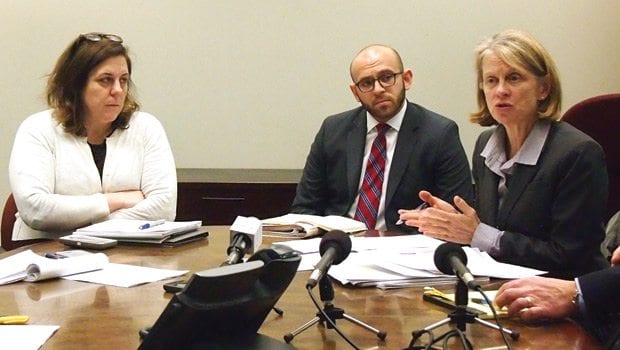City to file anti-displacement bills
Bills aimed at stemming tide of evictions

Tax credits for landlords who maintain below-market rents, free legal representation for indigent tenants facing eviction and the right of first refusal for tenants living in properties subject to foreclosure or short sale are among the legislative bills Mayor Martin Walsh’s administration is backing to combat displacement of moderate- and low-income Boston residents.
The five new measures administration officials announced last Friday include the Jim Brooks Community Stabilization Act, which would require owners of large buildings to notify the city of eviction notices and extend the city’s Inclusionary Development Policy to all developments of ten or more units, not just those requiring a zoning variance.
“This legislation is extremely important to make sure displacement is reduced in Boston,” said Sheila Dillon, the city’s housing chief and director of the Department of Neighborhood Development.
Jim Brooks Act
In addition to requiring landlords to notify the city prior to evictions, the Jim Brooks bill would also ban owners of buildings with seven or more units from evicting tenants without cause.
“They could no longer say, ‘Your lease or tenancy is up, I would like you to leave,’” Dillon said.
Dillon said the law is aimed at large property owners because they are most likely to clear buildings via evictions to make room for condo conversions, a move that often leaves long-term tenants in danger of homelessness.
Notification of evictions with cause would give the city the opportunity to help connect tenants to resources — to either contest an eviction or find emergency shelter or another housing opportunity. The law would not prevent landlords from raising rents as a device to clear tenants from a building.
Legal representation
The Act to Prevent Homelessness would guarantee the right to legal representation in eviction proceedings, thus enabling tenants who cannot afford a lawyer to receive free legal counsel, much in the same way public defense lawyers are assigned in criminal cases. The law would apply to the entire state.
“In Massachusetts, the field right now in front of housing courts or district courts, depending on where you’re bringing eviction cases, is very uneven,” said the city’s Assistant Corporation Counsel Sammy Nabulsi. “In Massachusetts, six percent of tenants walk into housing court with an attorney while a great majority of landlords have attorneys in those cases.”
Lydia Edwards, who heads the Mayor’s Office of Housing Stability, said that while the city is not planning to provide pro bono attorneys for low-income or elderly landlords, the city provides mediation and other services to help landlords with difficult tenants. Nabulsi said the law would save the state funding by reducing the number of people in costly emergency shelters in Massachusetts.
Tax credit
The Good Landlord Tax Credit would allow landlords who charge less than the HUD-determined fair market rate a $1,500 credit on their state income tax for up to six units. The HUD fair market rent for a two-bedroom apartment in Boston is $2,027.
“The Good Landlord Tax Credit is really a recognition by our administration that a lot of small landlords are feeling certain pressures with rising taxes, and many of them would like to maintain the tenancies they have, but many of them feel forced to raise rents due to economic pressures,” Edwards said.
First refusal
The Act Regarding Right of First Refusal would allow tenants of investor-owned buildings that are heading into foreclosure or short sale the opportunity to purchase the building at the short sale price, or to match the foreclosure amount.
“The best part about this is it brings the tenants to the table so that they’re not finding out about this foreclosure or sale of their building at the time of the auction. This right is also assignable,” Edwards said. “Tenants can assign this right to a local CDC or nonprofit, to a land trust, to a cooperative.
Anti-foreclosure activists in Boston have long sought cooperation from banks and mortgage companies like Fannie Mae to help nonprofits and tenants buy homes in foreclosure as a way to prevent speculators from flipping the properties and inflating prices.
Inclusionary Development Policy extended
Under current city policy, developers are subject to the Inclusionary Development Policy when they build ten or more units and require a zoning variance — for example, if they exceed height restrictions for a particular area. The Act Relative to Zoning would extend the Inclusionary Development Policy to all ten-plus unit buildings, regardless of zoning, which requires that 12 percent of units in new building be affordable.
Dillon said the legislative package is part of the city’s broader efforts to combat displacement.
“It’s a good package,” she said. “I think this complements all of our housing efforts. We’re putting more money towards affordable housing. We’re putting out city-owned property — millions of square feet for affordable housing. But as we build, we’re still getting calls that people are losing their homes. A lot of these ideas came from community activists. We’ve been in negotiations with community activists for the last six months. Now it’s time to file legislation at the State House.”
The Jim Brooks Act was filed with the City Council as a home rule petition. Dillon said she expects the act to pass. The city then will file the ordinance with the state. The bill extending legal services to tenants facing eviction is being sponsored by state Sen. Sal DiDimenico. Rep. Chynah Tyler is sponsoring the Jim Brooks Act. Sen. Linda Dorcena Forry and Rep. Dan Cullinane are sponsoring the Act Regarding Right of First Refusal. Sen. Joseph Boncore and Rep. Kevin Honan are sponsoring the State Income Tax Credit for Renting Unsubsidized Properties at Below Market Rents.


![Banner [Virtual] Art Gallery](https://baystatebanner.com/wp-content/uploads/2024/04/Cagen-Luse_Men-at-store-e1713991226112-150x150.jpg)



